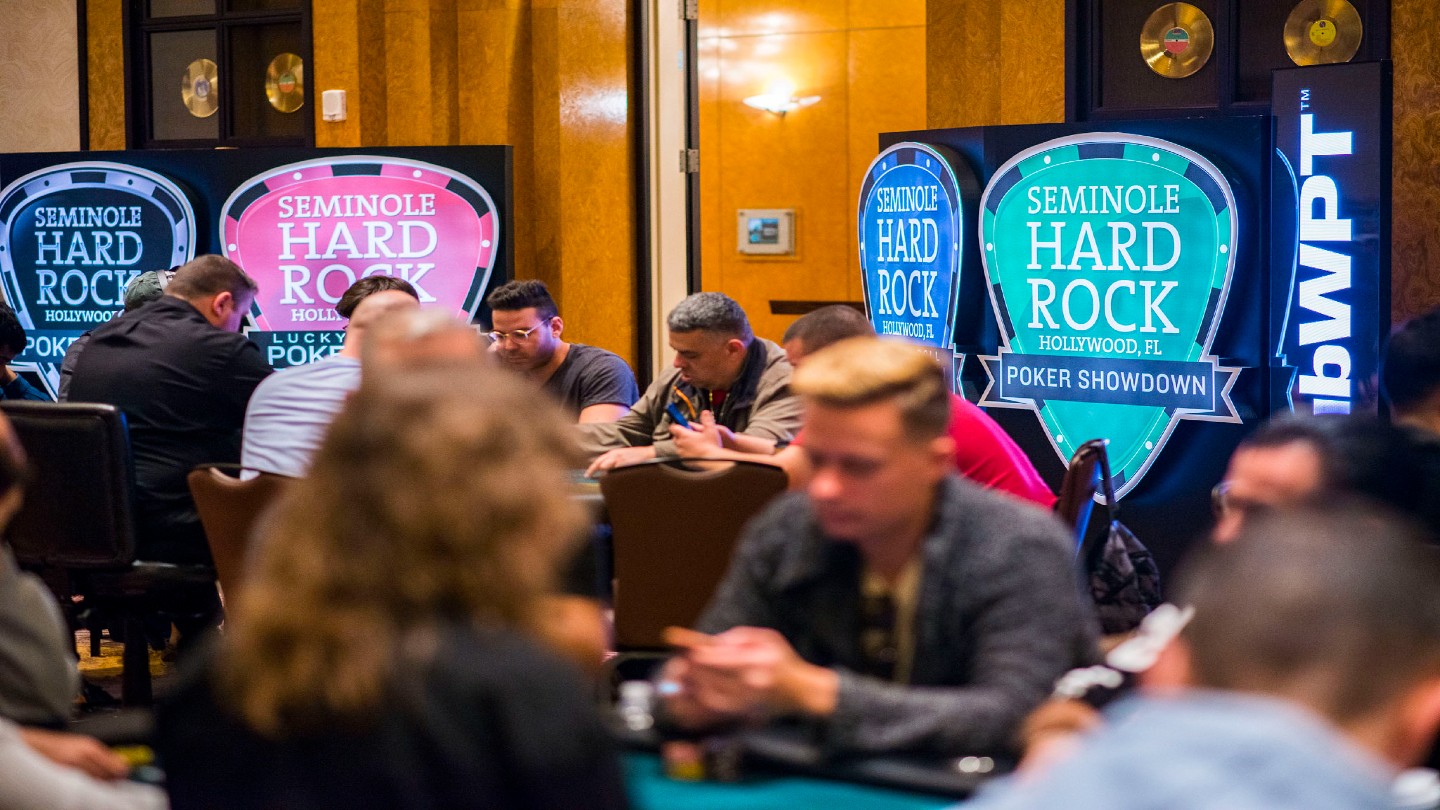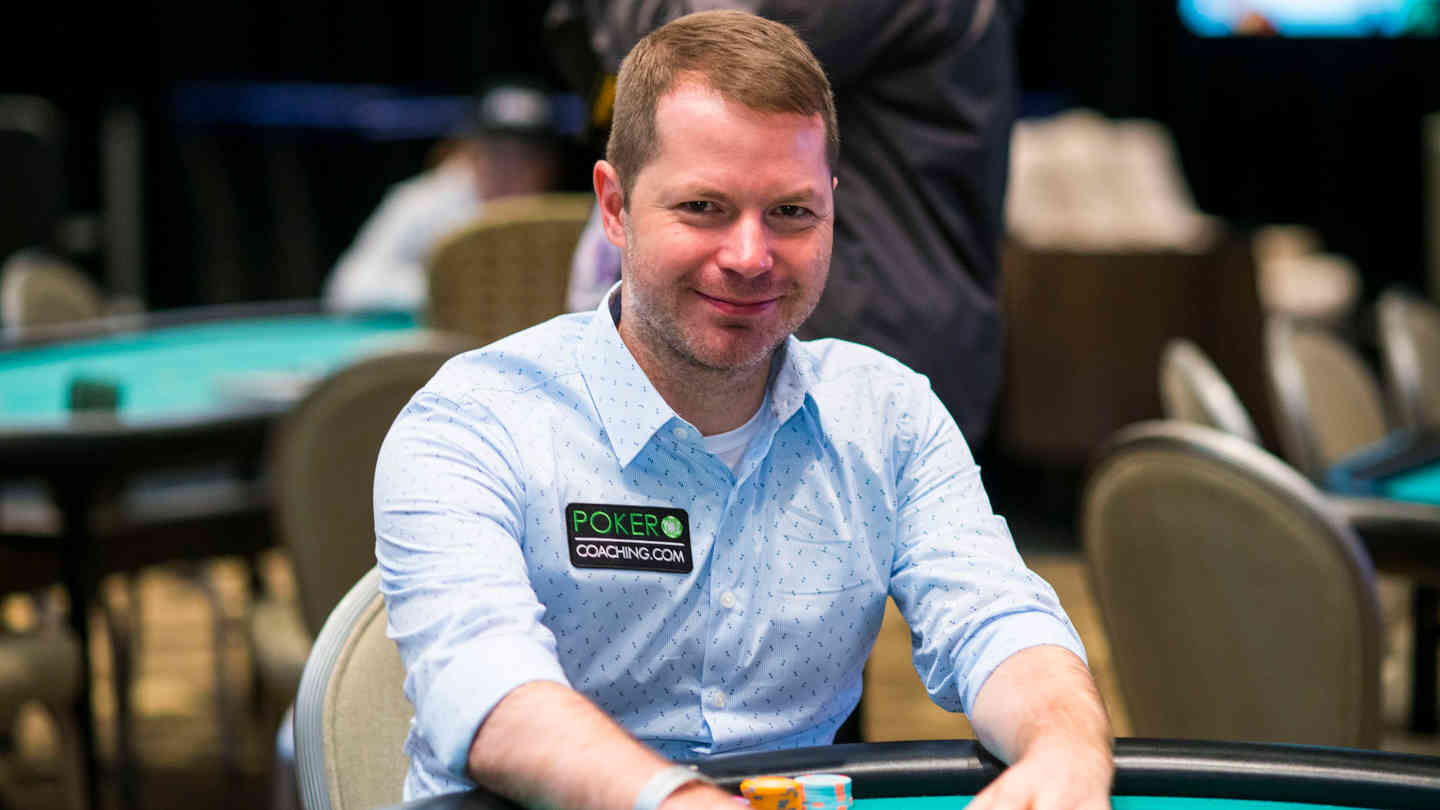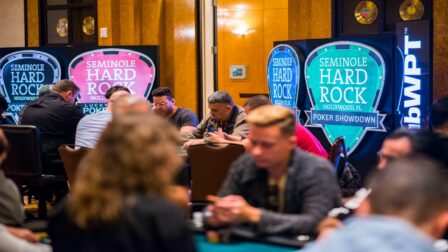The Life of a Live Reporter – A Day on the WSOP Circuit

16 minutes
Last Updated: February 1, 2024
When I share with people what I do for work, often they are surprised that there is an entire industry based around the game of poker.
Sure, people have heard of professional poker players before, but it is news to many that an individual like myself can have a full career centered around poker while not playing the game full-time.
For those of us familiar with poker and who, like myself, are part of the “community,” we can quickly rattle off many roles within the poker industry that are critical to its survival.
Dealers, Floor Supervisors, Tournament Directors, there are a plethora of roles other than “pro grinder” where individuals contribute within the poker industry.
Outside of my role at PokerCoaching.com and the brief internship I had with the World Series of Poker (WSOP) in 2018, the bulk of my professional experience has been as a live reporter for the WSOP Circuit.
The concept of an industry based entirely around poker can be surprising enough, but hearing I get paid to travel the United States and report on poker can be even more eye-opening to friends and family.
I usually say, “I’m like a sports reporter, but instead of sports, it’s poker,” but my fellow live reporters know a lot more goes into it than that.
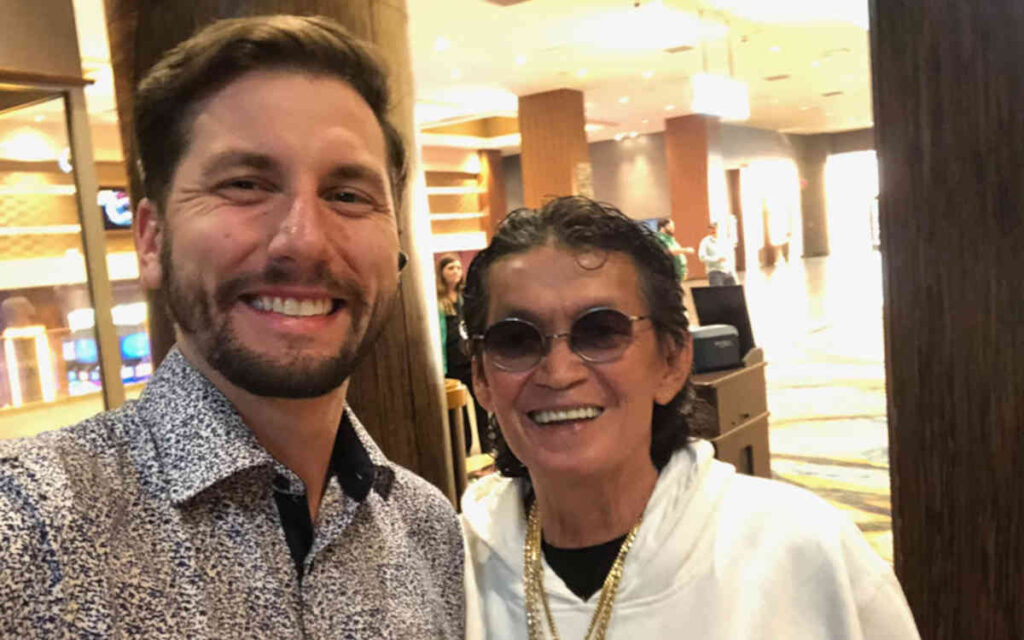
Me and poker legend Scotty Nguyen at the Choctaw WSOP Circuit series.
What Does a Live Reporter Do?
If you have ever played in or attended a major tournament series like the WSOP or the World Poker Tour (WPT), you have likely seen a live reporter walking around the tournament floor or orbiting a final table.
Donning a media pass and their nicest pair of khakis, the live reporter circles around the array of poker tables with a notepad and pen at the ready.
Witnessing a major poker hand in real-time and jotting down the play-by-play, the live reporter rushes over to their nearby laptop to post the hand history, praying it goes live before the busted player can share it on their Twitter/X account.
Reporting hand histories and posting live tournament updates is a major part of what a live reporter does, but especially on the WSOP Circuit, there is much more to the job than just live reporting hands.
Relaying Accurate News and Information
While it may seem like an implied “no-brainer,” the accuracy that is expected of live reporters is a major factor that comes with the role.
Whether it be the time of a tournament restart or what the official payouts are, poker players rely on updated pages for the important information they need to compete.
Almost every day I spend live reporting starts with me checking tournament event pages to ensure each event has an intro post complete with tournament start time and other important information. If a poker player is unsure if they will be late reg or not, such posts could assist them in making a decision.
Although I have already mentioned live reporting and writing hand histories, they are worth revisiting as their accuracy may be what poker players rely on the most from updates.
Every detail of a poker hand, whether it be the suit of the river card or how much a player bet on the flop, must be accurate when shared online.
While a mistake within a hand history doesn’t change the outcome of a hand, an inaccurate retelling can impact mentioned poker players after the fact.
Here is a scenario:
A young poker pro has just started traveling the WSOP Circuit and sells a large part of their action to sustain their bankroll.
They play in the Choctaw Circuit Main Event, make it deep into Day 2, and despite playing a particular hand well, their opponent gets the card they needed and busts the young pro out of the tournament.
No big deal. Busting is all a part of being a tournament grinder, but let’s say the hand history recounting the young pro’s elimination was littered with inaccuracies.
Although the young pro played his bust out hand in a strategic way, the inaccuracies in the hand history may make it look like the young pro punted their stack. With that kind of image published online, some of the young pro’s backers may elect not to buy any more of their action!
While an extreme example, poker players rely on live reporters to depict them accurately and in their entirety, an undertaking not to be taken lightly!
What Happens When a Live reporter Makes a Mistake
Live reporters go to much effort to ensure they share accurate information, but even the best ones make occasional mistakes. While I’ve shared what could happen as a result of a posted inaccuracy, let me tell you what live reporters fear the most: Poker Twitter.
If you make a bad enough mistake when sharing updates and hand histories, there is a strong likelihood it will be shared on Twitter/X (likely by Allen Kessler).
As someone who has been there, the shame and embarrassment that comes from seeing one of your mistakes discussed on Twitter is gut-wrenching.
Even if no one knows that you specifically were the one who made that error, you knowthat you were the one who made that error, causing you to have an anxiety attack at O’Hare International Airport.
I’ve certainly complained about my work being dissected by the masses, but not only does such scrutiny come with the territory, but it makes us better at our job.
Every time one of my mistakes has been mentioned online or to me in person, I can guarantee the immediate hand histories that followed were triple-checked and some of the best I’ve ever done.
Sometimes you need a fire lit under your ass, even if you are the one that caused the fire to begin with.
It can be a thankless job. If you do it perfectly, often no one gives you any attention or credit. When you make a mistake, no matter how minor, you'll find your mistake blasted on social media quicker than you ever thought possible.
T.J. Reid, Live Event Manager for Poker.org
While the Poker Players Sleep, We Enter Data
Other than live reporting on hands, entering data and results to WSOP.com is one of the biggest tasks for live reporters/media coordinators on the WSOP Circuit.
If you have ever been fortunate enough to cash in a WSOP event, at some point a live reporter or WSOP staff member has uploaded your results to your official WSOP player profile.
Whether it is a min-cash in a $250 buy-in event or a runner-up finish in the series high roller, someone must enter the results along with end-of-day chip counts, seating assignments, and prize pools that come with almost every WSOP Circuit event.
Since live reporters are busy covering the action when the players are playing, most of the required data entry comes at the end of the play after players depart for the evening.
While good time management can help prevent late nights, sometimes trying to land an interview with T.J. Cloutier will cause you to postpone inputting results.
So, at 2 a.m. all alone in The Grand Theater of Choctaw Casino and Resort, you try and figure out which of the five Robert Smiths from Norman, Oklahoma, won $839 in the Congress tournament.
To be fully honest, though, you aren't completely alone, as fellow members of the team are usually available to help via Slack. There is also a sweet lady named Theresa who works on payouts late at night, and she will share candy with you if you’re nice.
Interviewing Poker Players
By far, my favorite part of live reporting is getting to interview poker players and tournament winners.
With the game of poker attracting all sorts of people from different backgrounds and cultures, there is never a shortage of intriguing people to interview at a major poker tournament.
Although I’ve had the opportunity to interview poker legends such as T.J. Cloutier and Scotty Nguyen, my favorite interviews have come from the likes of six-time WSOP Circuit ring winner Pam Belote and a cigar-toting Steven “Cuz” Buckner.
Even though I am not a professional poker player, I take my poker playing very seriously with grinding and studying. As someone who dreams of winning major tournaments, interviewing individuals immediately after they win WSOP Circuit rings is always an amazing experience.
At many locations on the Circuit trail, local poker players make a major effort to play every Circuit event that comes to town, dreaming of one day winning a ring.
Some poker players compete for years winning their first Circuit tournament, and when I get the chance to interview a long-time vet after their first victory, it is nothing short of inspiring.
After I return home to Tacoma, Washington, following a couple of weeks of reporting on the WSOP Circuit, it doesn’t take me long to make my way over to the local poker room.
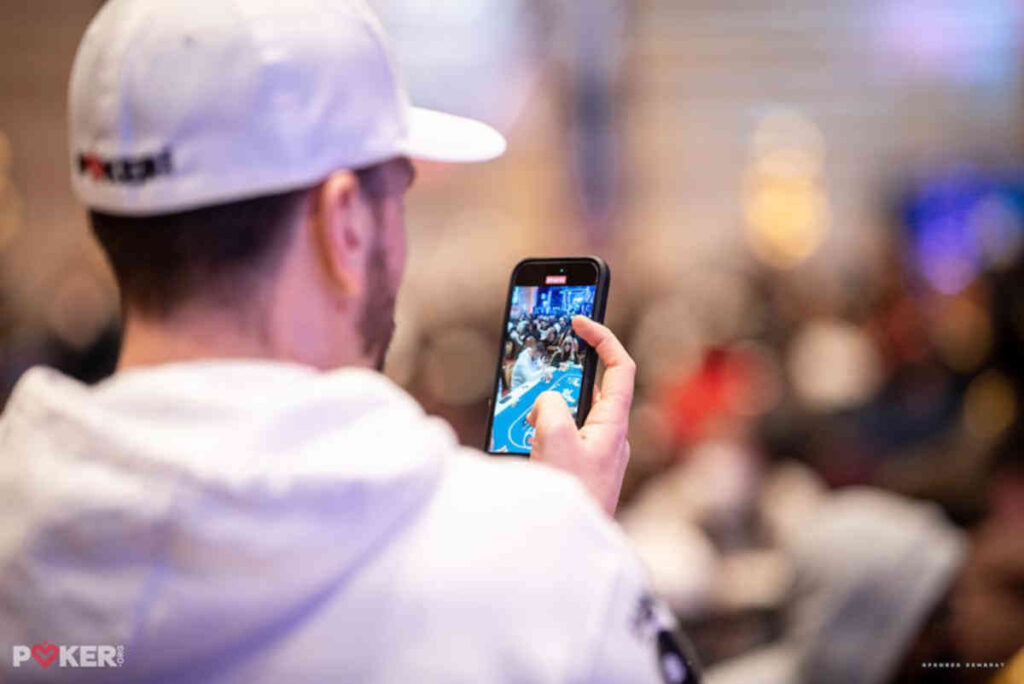
Photo courtesy of Spenser Sembrat and 8131 Media.
Capturing Content for Poker.org
Starting in the summer of 2023, Poker.org took over live reporting responsibilities for the WSOP Circuit. With additional live reporting and updates for all WSOP Circuit events, they would also introduce media and content for their social media channels.
With the inclusion of content-capturing, they further added to the coverage of the WSOP Circuit and made the series even more engaging for poker players and fans.
Along with getting to be around poker, one of the biggest perks that comes with being a live reporter is getting the opportunity to build new skills that have major value in the poker industry.
While I have not worked with social content for some time, the WSOP Circuit has provided a great opportunity to get back into the game and improve my abilities when it comes to capturing videos and photos.
Of the video content I’ve captured so far, my favorite has been this video with Pam Belote following her sixth Circuit ring victory:
Life on the WSOP Circuit Trail
With the many responsibilities that come with being a live reporter for the WSOP Circuit, I could easily continue to discuss the work I do on the tournament floor, but what the job entails away from the tables certainly deserves mention as well.
There are plenty of jobs out there that require individuals to travel frequently, but most of those jobs don’t have you reside in a casino for weeks at a time.
Life on the road as a WSOP Circuit live reporter can be tiresome, but it offers truly unique day-to-day that some individuals prefer to a normal 9 to 5.
Other than being asked what my job entails on the road, folks often ask what life is like when I am traveling for the WSOP Circuit, and I am always happy to share!
Flying Across America
I’m ashamed to admit that even with the frequent travel I do for poker and leisure, I still do not have a TSA pre-check (I should have it by WSOP 2024, though).
Pre-check aside, traveling for the WSOP Circuit has required me to become a “better flyer” and familiarize myself with frequent flying. Do I still forget things constantly and get to the airport way too early? Absolutely, but I’m getting better!
Along with learning what outfits will give me the least hassle when going through security and how to properly prepare podcasts for a cross-country flight, the biggest lesson I’ve learned is how critical it is to get the most out of travel days.
When I first began flying as a live reporter, every travel day was a free day. If I am about to work for 14 days straight at Choctaw, why would I make myself be productive at Sea-Tac International Airport? I need to conserve my energy!
Although I still avoid working on flights, when waiting at airports and after I arrive at tournament venues, I do my best to hit the ground running.
Whether prepping tournament intros, shooting content for social, or working on tasks for my full-time job, taking the time to get ahead can make the entirety of a WSOP Circuit series much easier.
Getting the most out of your travel days isn’t exclusive to work, either! Since live reporters usually do not get an “off day” throughout a WSOP Circuit series, their limited free time usually comes from travel days and the evening after the Main Event ends.
So, if I’m fortunate enough to have booked an early morning flight on my arrival day, once I’m settled in my room I will usually try and play some live $1/$3 later in the day.
Watching folks play poker for days at a time without getting to play yourself can be torturous, so getting as much of it out of my system early is always helpful.
Hotels Rooms and Living Out of a Suitcase
I have always been enamored with hotel rooms. The phenomenal A/C, the strong water pressure, and the fact that it’s free make it incredibly enjoyable for a guy who grew up staying at Motel 6.
Every hotel I was put in during the WSOP Circuit events has been enjoyable, but 14 days in any hotel room can be a challenge.
The biggest obstacle that comes with residing in hotels during WSOP Circuit gigs is handling clothes and laundry. While some live reporters may go to the effort of coordinating dry cleaning or finding a local laundry mat, such an endeavor may not be feasible with a busy schedule.
Breaks are encouraged, but every second I spend away from the tournament floor, I risk missing something big that could have been worth recording.
My strategy: I simply pack a lot of clothes, enough to easily get me through two weeks on the road. While I may return home with a crap ton of laundry to do, being properly packed is much easier now that I stick to street clothes when working.
While I still can’t figure out how to use the iron in the hotel room, the classic hoodie/khaki combo rarely needs a touch-up.
Maintaining Healthy Habits on the Road
Exercise
I will come right out and admit I have only exercised one time while on the road live reporting for the WSOP Circuit. I say that it is because I’m prioritizing sleep to be well-rested for busy work days, but in actuality, I just lack discipline.
Although I lack the fortitude to carry over the healthy habits I maintain at home, I know multiple live reporters who still find a way to hit the gym even when on the road.
While sleep and time can certainly stand in the way of maintaining an exercise routine on the road, every hotel has a suitable gym. If you can muster the strength to get out of bed and get to the gym, getting quality exercise is possible for the committed.
Diet
I have already shared how I find managing my wardrobe to be the hardest thing to manage when traveling for work but finding suitable and healthy food is a close second.
While media companies cover travel and hotel expenses, they do not cover food outside of the occasional per diem. Although the suitable wage live reporters receive more than covers food expenses, securing not only food but also healthy food requires some planning.
Hotels and casinos rarely lack options when it comes to restaurants, but if you rely on these vendors, you are essentially “eating out” every time you have a meal. While this may be an option for some, it is an expensive one that cuts into your overall earnings for the trip!
I may eat at restaurants within host casinos occasionally, but usually, when I am on the road, I rely on grocery trips and mobile orders.
Although I have attempted to pack food in checked bags, it is impossible to pack enough, and the one time I attempted it, I was charged an overweight fee for my luggage (damn those heavy soups).
The grocery plan that works: using free time to visit the store or have groceries delivered to the hotel using an app like Instacart.
When I’m in Choctaw, poker photographer, and friend Eric Butler is always down to make a quick trip to Walmart and tell you fun WSOP Circuit stories along the way.
Why Do I Work as a Live Reporter?
Being a live reporter on the WSOP Circuit is certainly not easy, but there are many reasons why I come back to it even with my full-time job. For starters, it pays well and has been a great source of income for my enduring gambling addiction.
Outside of the financial value, though, one of the major motivators that has led me to accept live reporting gigs is the +EV they have professionally.
Every WSOP Circuit series gives me an opportunity to not only showcase my writing and media abilities but also gives me a chance to make connections with players and staff in person.
Before he became the Live Events Manager, Terrance “T.J.” Reid and I met as live reporters for a WSOP Circuit Series at Thunder Valley in Lincoln, California. Working together for the first time, T.J. and I built a great rapport that eventually led to me working as a live reporter.
Having been in the live reporting game for years, T.J. shared with me what thoughts he had regarding our profession:
The best live reporters are those who truly love the game and the players. You won't get rich, you won't get benefits, and you won't get famous, but you can travel the world and get closer to the game you love than you ever thought possible.
Getting to connect and learn from people like T.J. makes live reporting gigs truly rewarding experiences, with me ending each Circuit series a better reporter than I was when it started.

My favorite memory from working as a live reporter: meeting Lon McEachern and Norman Chad with my brother Chris.
For the Love of the Game
Earlier in this article, I expressed how often I return home from a WSOP Circuit series, I will usually start playing poker as soon as I can, and that is no exaggeration.
Sure, I will sleep for 24 hours as soon as I get through the door, but after some rest and a homecooked meal, I’m off to Ace’s in Lakewood for some $1/$3.
While watching people play poker for weeks at a time certainly puts me in the mood to play, it also inspires me to improve as a player and work to potentially win accolades of my own.
Even if the job eventually impacts how live reporters perceive the game, almost every peer I’ve met has some affection for the game of poker. Grinder or not, each one plays the game in some capacity and pursues a career where their life seemingly revolves around a silly game.
You may never go pro, but if you truly have a passion for poker, the game can provide you with ways to make a living from it. For me, poker has provided me the opportunity to travel, write, and meet incredible people who have had an overwhelmingly positive impact on my career.
Is being a live reporter easy? Certainly not, but neither is poker, and I find myself wanting to play quite a bit.









